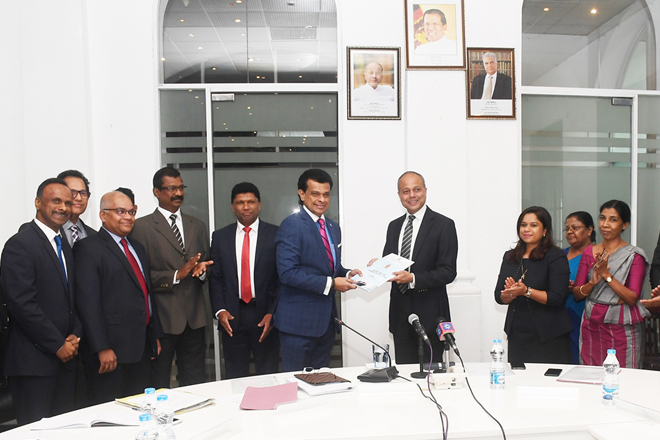Sri Lankan ports need shift from regional transshipment to global maritime hubs

Jan 31, 2019 (LBO) – Sri Lanka Ports Authority said the final draft of the National Policy for Maritime and Logistics Sectors has been presented to the Ports & Shipping Minister Sagala Ratnayaka, today.
The draft has been prepared to understand the importance of a national policy for the alignment of maritime and logistics sectors to reap the benefits towards the development of Sri Lanka.
The policy was drafted by a committee comprised of leading experts on maritime affairs chaired by Dr. Parakrama Dissanayake with around 80 stakeholders participating during the formulation of the policy.
According to the policy, “Major Sri Lankan ports need to transform themselves from ‘regional transshipment hubs’ to ‘Global Maritime Hubs’ in order to face the competition from emerging new regional transshipment ports as well as traditional global competitors.
Continued dependence on the Indian subcontinent for a major portion of the business will no longer be possible due to emerging regional competition, expansion of direct mainliner service to traditional feeder ports and changes in cabotage laws.
“One needs to recognize the fact that all major global hubs are relay centres for major shipping lines. The share of relay traffic in global hubs far exceeds the share of Hub and Spoke transshipment thus making them less vulnerable to the emergence of regional competition,"
"However, this change will require the development of port and logistics facilities well ahead of such demand. Sri Lanka has hitherto followed a policy of waiting for demand to push before new port/terminal facilities are to be developed. This policy allowed other regional hubs to overtake Colombo in the past,"
"It is, therefore, necessary to shift the development policy from “demand-driven” to “supply-driven”, the final draft of National Policy for Maritime and Logistics Sectors has suggested.
The minister has requested for feedbacks from the interested parties and the general public and has ensured the promulgation of this national policy as quickly as possible.
Around hundred and fifty pages document comprehensively detailed the strategies, suggested actions and coordinating role of each party while addressing the urgent requirements of the maritime and logistics sectors in Sri Lanka.
It has addressed the several areas of the subject including, Ports and Related Infrastructure; Development of Maritime Related Services; Ships, Ship Owning, Ship & Crew Management, Shipping & NVOCC Agency, Coastal Shipping ; Development of Logistics and Intermodal Infrastructure, Harmonization of Regulatory Framework ; Maritime Safety, Security, Marine Pollution Prevention, Maritime Training; Promotion of Small & Medium Scale Enterprises in Maritime and Logistics; Restrictive Practices in Maritime and Logistics.
One of the aims of this national policy is to “encourage sustainable port development to cater to long-term forecasted growth in volumes of imports and exports and transshipment trades by sea, with a competitive and efficient port industry capable of meeting the needs of importers and exporters in a cost-effective and timely manner.
The vision of this national policy reads as to “become a leading Global Maritime and Logistics Hub while maintaining a premier status in regional Maritime and Logistics by affording and facilitating the best technology and convenience to all stakeholders thus facilitating the economic growth in Sri Lanka.”
Sri Lanka’s Maritime and Logistics business generate the much needed foreign exchange to the country. The particular sector includes; domestic and transshipment container operations, a range of logistical services, ship repairs, supply of bunkers and ship spares, maritime education and training, logistics and supply chain management.
Of the above, container operation is the single largest source of foreign exchange.
In 2018, the Port of Colombo elevated to a greater position in the global container-port league, registering a throughput of over 7 million TEUs (The twenty-foot equivalent unit).
Sri Lanka’s Port of Colombo has advanced to occupy a leading position in the world as one of the best-connected ports with over 59 mainline services calling each week, placing it ahead of other regional ports while it was placed marginally behind the world’s leading ports.
Chairman of the Sri Lanka Ports Authority Kavan Ratnayaka, Managing Director of the Sri Lanka Ports Authority Captain Athula Hewawitharana, Executive Director of Sri Lanka Ports Authority Dr. Emerick Fernando, several stakeholders and experts of the subject were present the event.
